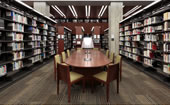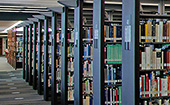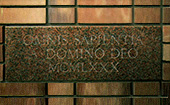Library introduction
Ikebukuro Library

The Ikebukuro Library was opened in November 2012 by integrating multiple libraries on the Ikebukuro Campus. It is a large-scale library with a storage capacity of 2 million books and about 1,600 reading seats in a 5-layer structure from B2F to 3F. In addition to a quiet study and research area, there are some active learning areas that promote group studies and consultation booths by learning advisors. As a comprehensive study library and research library, we support the learning, education, and research of our users by responding to the diverse needs of both visitors and remote-access visitors.
Awards
- 平成24年度 省エネ・照明デザインアワード(優秀事例)
- 2013年度 グッドデザイン賞
- 2014年度 第30回日本図書館協会建築賞
Ikebukuro Library Floor Guide
History of the Ikebukuro Library and related materials
Niiza Library

The Niiza Library is a general study and research library mainly used by the faculties and graduate schools on the Niiza Campus. Opened in 1998, the library has undergone two expansions and renovations. The first floor is a quiet space with reading seats and bookshelves, while the second floor is an active space where group studies are available. Functioned as a depositary library for the United Nations World Tourism Organization (UN Tourism), the library support learning, education, and research at the Niiza Campus.
Niiza Library Floor Guide
History of the Niiza Library and related materials
Niiza Repository Library

A university library must collect books, maintain them, use them, and preserve them. Regarding the duty of preservation, Rikkyo University was the first in Japan to try a “repository library” strategy, and has gained significant attention for it. The Repository Library was built on the Niiza Campus in 1982. Today the Repository Library at Rikkyo University features a wealth of materials in storage, such as Episcopalian writings, approximately 80 thousand monographs collected in 1955 and earlier, periodicals (including US and European newspapers) released in 1970 and earlier, book sets, and reading materials that have hardly been used.
Former Library

Although former "Rikkyo University Main Library" buildings are no longer used as a library since the opening of "Ikebukuro Library" in 2012, they are still used as "Rikkyo Gakuin Exhibition Hall" and "Mather Learning Commons".










 Use
Use Support
Support My Library
My Library
 About Us
About Us